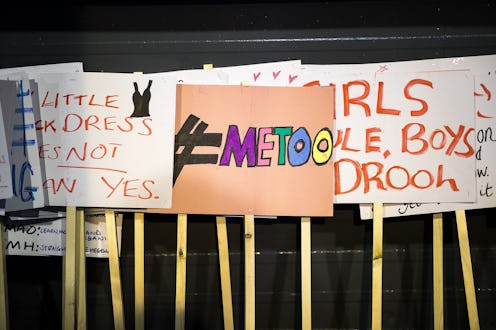Books
Emily Doe, Who Wrote A Victim's Statement In The Brock Turner Case, Is Releasing A Memoir

Three years ago, one brave young woman wrote and read a 12-page victim impact statement, later translated into several languages, which addressed the recurring trauma of being sexually assaulted behind a dumpster at a college party. Now, Emily Doe's new memoir reclaims the narrative for victims of sexual violence, whose stories are so often drowned out by the public's skeptical and misogynistic demands to know what they were wearing and how much they had to drink. Out in September from Penguin Random House imprint Viking Books, Emily Doe's memoir will expose the real toll of pursuing justice in cases of rape, and "will change the way we talk about sexual assault forever," according to a Wednesday press release from Audere Media.
In January 2015, Stanford student Brock Turner sexually assaulted a woman — known to the public only as "Emily Doe" — behind a dumpster at a college frat party. She woke up in the hospital, hours later, with no memory of the attack or the events leading up to it. The nurse who later collected evidence for Doe's rape kit testified in court that she had "significant trauma" to her vaginal area.
Unlike most perpetrators of sexual violence, Turner was arrested and convicted of three counts of felony sexual assault. The charges carried a maximum sentence of 14 years in prison, but Turner was sentenced to only six months in jail and three years' probation. He was released into protective custody after serving just three months behind bars. The sentencing judge, who has since been removed from his position, seemed to have agreed with Turner's father, Dan Turner, who wrote in a statement that his son should not be punished for "20 minutes of action."
In the press release announcing Emily Doe's memoir, Viking Books editor-in-chief Andrea Schulz wrote that "Emily Doe’s experience illuminates a culture built to protect perpetrators and a criminal justice system designed to fail the most vulnerable." Turner's exceedingly light punishment for what was, by all accounts, a brutal assault is emblematic of the injustices that the legal system heaps upon rape victims. According to RAINN, "only 5 out of every 1,000 perpetrators will end up in prison" for their crimes. Because only 230 sexual assaults out of every 1,000 are reported to police, and because only 46 out of every 1,000 reports lead to an arrest, the overwhelming majority of rapists and sexual abusers will never see the inside of a jail cell. And yet, even when a case does lead to a felony conviction, the courts often take pity on the perpetrators, slapping them on the wrists with absurdly lenient sentences.
The media also fails victims, often by attempting to humanize their attackers. In her victim impact statement, Doe wrote that she had "learned about the graphic details of my own sexual assault" from an online news article, which "listed [Turner's] swimming times" at the bottom. "She was found breathing, unresponsive with her underwear six inches away from her bare stomach curled in fetal position," Doe wrote. "By the way, he’s really good at swimming."
In the #MeToo era, Doe's voice can reemerge as a rallying cry for justice in sexual assault and rape cases. Schulz says that Emily Doe's memoir "will introduce readers to the writer whose words have already changed their world and move them with its accounting of her courage and resilience." In it, Doe "will share her experience in emotional, honest and eloquent detail," according to the press release, and readers will see how "[h]er story continues to be a testament to the power of words to heal and effect change."
Emily Doe's memoir is out in Sept. 2019 from Viking Books.
This article was originally published on